广州版小学英语六年级上每单元知识点
- 格式:doc
- 大小:441.50 KB
- 文档页数:12
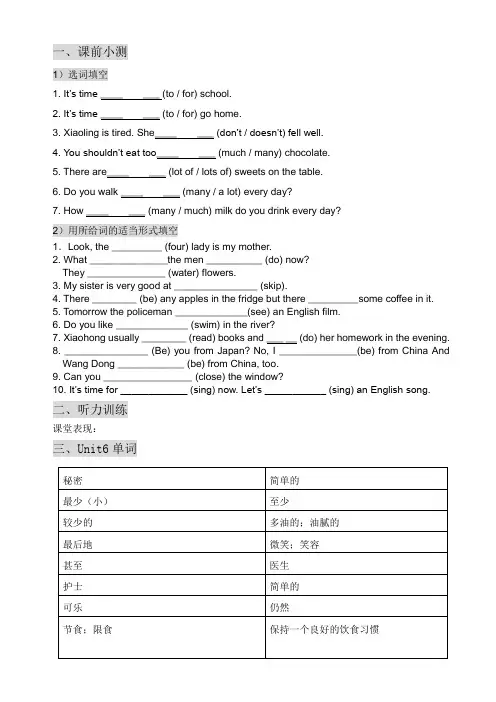
一、课前小测1)选词填空1. It’s time ____ ___ (to / for) school.2. It’s time ____ ___ (to / for) go home.3. Xiaoling is tired. She____ ___ (don’t / doesn’t) fell well.4. You shouldn’t eat too____ ___ (much / many) chocolate.5. There are____ ___ (lot of / lots of) sweets on the table.6. Do you walk ____ ___ (many / a lot) every day?7. How ____ ___ (many / much) milk do you drink every day?2)用所给词的适当形式填空1.Look, the _________ (four) lady is my mother.2. What ______________the men __________ (do) now?They ______________ (water) flowers.3. My sister is very good at _______________ (skip).4. There ________ (be) any apples in the fridge but there _________some coffee in it.5. Tomorrow the policeman _____________(see) an English film.6. Do you like _____________ (swim) in the river?7. Xiaohong usually ________ (read) books and ___ __ (do) her homework in the evening.8. _______________ (Be) you from Japan? No, I ______________(be) from China And Wang Dong ____________ (be) from China, too.9. Can you ________________ (close) the window?10. It’s time for ____________ (sing) now. Let’s ___________ (sing) an English song.二、听力训练课堂表现:三、Unit6单词秘密简单的最少(小)至少较少的多油的;油腻的最后地微笑;笑容甚至医生护士简单的可乐仍然节食;限食保持一个良好的饮食习惯四、Unit6 短语take exercise, stay healthy, at least, keep a good die五、Unit6 句型1. First, get plenty of sleep.2. Don’t eat too much sweet or oily food.3. How old does Mr Li look?4. Get up early and go to bed early.六、知识考点1. Keep a good diet. 保持一个良好的饮食习惯。

六年级上英语知识点广州新版集团标准化办公室:[VV986T-J682P28-JP266L8-68PNN]个性化教学辅导教案学科:英语任课教师:陈老师授课时间: 2015 年9 月 12日(星期考点:人称代词和物主代词能力:方法:称代词和物主代词的用法作业完成情况:优□良□中□差□建议__________________________________________Unit3 Where are you fromStep1:检查作业,讲解习题,复习上节课内容。
错题回顾:一、选择a或an填空。
_____apple ______useful pen _____hour ______house______umbrella ______university old man interesting story②This is ______ ring, and it is _____orange ring. ③There is _____ picture on the card.⑥That is _____ ID card. ⑨This is _____useful knife.( ) 12. He likes ______his father ____the cow.A. helping; milksB. helping; milkC. helps; milkD. help;milks( ) 9. My ball is here. Where is_____?A. yoursB. yourC. you( ) 12. ----Is this ______ eraser? -----No, ______is white.A. your, myB. yours, mineC. your, mine( ) 13. ----Is it _____ football? -----No, _____is under the table.A. his, heB. his, hisC. his, hers( ) 16. ----Are these pens_____? ---No, they are _____.A. yours, hisB. his, herC. ours, theirA. Our, TheirB. Ours, TheirsC. Our, TheirsStep2: Warm up热身Step 3:复习Unit31)单词和词组城市学生安静的便宜的现代化的嘈杂的宽阔的缓慢的拥挤的舒服的沉重的,拥挤的1. Where you from? 你来自哪里?2. I there. 我出生在那儿。
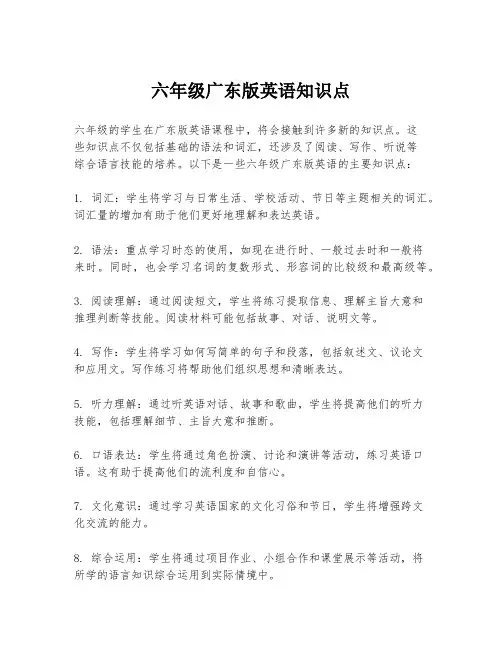
六年级广东版英语知识点六年级的学生在广东版英语课程中,将会接触到许多新的知识点。
这些知识点不仅包括基础的语法和词汇,还涉及了阅读、写作、听说等综合语言技能的培养。
以下是一些六年级广东版英语的主要知识点:1. 词汇:学生将学习与日常生活、学校活动、节日等主题相关的词汇。
词汇量的增加有助于他们更好地理解和表达英语。
2. 语法:重点学习时态的使用,如现在进行时、一般过去时和一般将来时。
同时,也会学习名词的复数形式、形容词的比较级和最高级等。
3. 阅读理解:通过阅读短文,学生将练习提取信息、理解主旨大意和推理判断等技能。
阅读材料可能包括故事、对话、说明文等。
4. 写作:学生将学习如何写简单的句子和段落,包括叙述文、议论文和应用文。
写作练习将帮助他们组织思想和清晰表达。
5. 听力理解:通过听英语对话、故事和歌曲,学生将提高他们的听力技能,包括理解细节、主旨大意和推断。
6. 口语表达:学生将通过角色扮演、讨论和演讲等活动,练习英语口语。
这有助于提高他们的流利度和自信心。
7. 文化意识:通过学习英语国家的文化习俗和节日,学生将增强跨文化交流的能力。
8. 综合运用:学生将通过项目作业、小组合作和课堂展示等活动,将所学的语言知识综合运用到实际情境中。
9. 自我评价:鼓励学生进行自我反思和评价,以提高自主学习能力和自我监控能力。
10. 学习策略:教授学生有效的学习策略,如预习、复习、笔记技巧等,帮助他们更有效地学习英语。
通过这些知识点的学习,六年级的学生将为进一步的英语学习打下坚实的基础,并为将来的学术和职业生涯做好准备。
记住,学习语言是一个持续的过程,需要耐心和持续的努力。
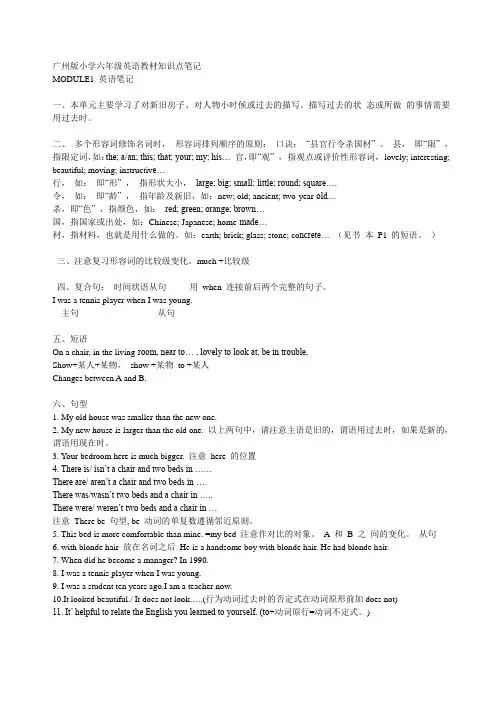
广州版小学六年级英语教材知识点笔记MODULE1 英语笔记一、本单元主要学习了对新旧房子、对人物小时候或过去的描写。
描写过去的状态或所做的事情需要用过去时。
二、多个形容词修饰名词时,形容词排列顺序的原则:口诀:“县官行令杀国材” 。
县,即“限” ,指限定词,如:the; a/an; this; that; your; my; his… 官,即“观” ,指观点或评价性形容词,lovely; interesting; beautiful; moving; instructiv e…行,如:即“形” ,指形状大小,large; big; small; little; round; square….令,如:即“龄” ,指年龄及新旧,如:new; old; ancient; two-year-old…杀,即“色” ,指颜色,如:red; green; orange; brown…国,指国家或出处,如:Chinese; Japanese; home-made…材,指材料,也就是用什么做的。
如:earth; brick; glass; stone; co ncrete… (见书本P1 的短语。
)三、注意复习形容词的比较级变化。
much +比较级四、复合句:时间状语从句--------用when 连接前后两个完整的句子。
I was a tennis player when I was young.主句从句五、短语On a chair, in the living-room, near to… , lovely to look at, be in trouble,Show+某人+某物,show +某物to +某人Changes between A and B.六、句型1. My old house was smaller than the new one.2. My new house is larger than the old one. 以上两句中,请注意主语是旧的,谓语用过去时,如果是新的,谓语用现在时。
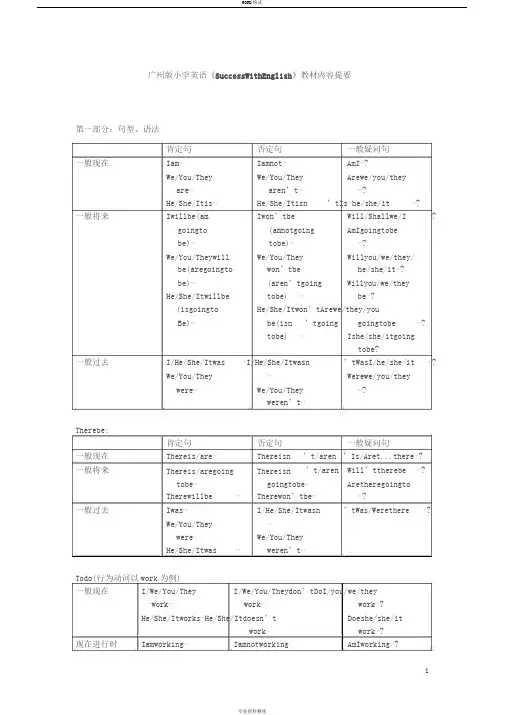
广州版小学英语《SuccessWithEnglish》教材内容提要第一部分:句型、语法肯定句否定句一般疑问句一般现在Iam⋯Iamnot⋯AmI⋯?We/You/They We/You/They Arewe/you/theyare⋯aren’t⋯⋯?He/She/Itis⋯He/She/Itisn ’tIs⋯he/she/it ⋯?一般将来Iwillbe(am Iwon’tbe Will/Shallwe/I ⋯?goingto (amnotgoing AmIgoingtobebe)⋯tobe)⋯⋯?We/You/Theywill We/You/They Willyou/we/they/be(aregoingto won’tbe he/she/it⋯?be)⋯(aren’tgoing Willyou/we/theyHe/She/Itwillbe tobe) ⋯be⋯?(isgoingto He/She/Itwon’t Arewe/they/youBe)⋯be(isn ’tgoing goingtobe ⋯?tobe) ⋯Ishe/she/itgoingtobe?一般过去I/He/She/Itwas ⋯I/He/She/Itwasn ’t WasI/he/she/it ⋯?We/You/They ⋯Werewe/you/theywere⋯We/You/They ⋯?weren’t⋯Therebe:肯定句否定句一般疑问句一般现在Thereis/are⋯Thereisn ’t/aren ’Is/Aret...there⋯?一般将来Thereis/aregoing Thereisn ’t/aren Will’t therebe ⋯?tobe⋯goingtobe⋯AretheregoingtoTherewillbe ⋯Therewon’tbe⋯⋯?一般过去Iwas⋯I/He/She/Itwasn ’t Was/Werethere⋯?We/You/They ⋯were⋯We/You/TheyHe/She/Itwas ⋯weren’t⋯Todo(行为动词以work为例)一般现在I/We/You/TheyI/We/You/Theydon’t DoI/you/we/theywork⋯work⋯work⋯?He/She/Itworks⋯He/She/Itdoesn’t Doeshe/she/itwork⋯work⋯?现在进行时Iamworking⋯Iamnotworking AmIworking⋯?1We/You/Theyare ⋯Areyou/we/theyworking⋯We/You/Theyaren’t working⋯?He/She/Itis working⋯Ishe/she/itWorking⋯He/She/Itisn ’t working⋯?working⋯一般将来I/We/You/He/She/It I/We/You/He/She/It/They WillI/we/you//Theywillwork won’twork ⋯they/he/she/it⋯I’mnotgoingtowork ⋯work⋯?I’mgoingtowork We/You/Theyaren’t AmIgoingto⋯goingtowork ⋯work⋯?We/You/Theyare He/She/Itisn ’tgoingtoAreyou/we/theygoingtowork ⋯work⋯goingtoworkHe/She/Itisgoing ⋯?towork⋯Ishe/shegoingtowork⋯?一般过去I/We/You/They/He/ I/We/You/They/He/ DidI/we/you/they/She/Itworked ⋯She/Itdidn ’twork ⋯/he/she/itwork⋯?1.读下面的特殊疑问式的句子,你能总结一些特殊疑问句的构成的规律吗?I.Wholivesthere.Whoissingingintheroom?Whowasathomeyesterday?II.Whatdoeshedo?Whatishedoing?Whatdidtheydo?Whendoesheusuallygetup?Whendidshehavedinneryesterday?Whereishenow?Wherearetheyplantingtrees?Wheredidtheyplayfootball?Howisyourmother?Howishecoming?Howdidtheygetthere?Whydoeshegothere?Whydidshegothere?III.Whosebookisthis?Whoseparentsarecominghere?Whichbookisyours?Whichpresentsdidhegiveyou?22.关于形容词、副词的比较级和最高级(1)你知道形容词、副词的比较级和最高级构成的一些规律吗?A.一般情况下加-er,-est:long–longer,longest;small–smaller,smallestB.重读闭音节,双写最后一个字母再加-er,-est:big–bigger,biggest; hot–hotter,hottestC.辅音字母加y,改作后一个字母y为i再加-er,-est:funny–funnier,funniest, lucky–luckier,luckiestD.部分双音节和多音节词,加more,most:slowly–moreslowly,mostslowly; moredelicious,mostdeliciousE.不规则变化:good–better,best; bad–worse,worst(2)你知道形容词、副词的比较级和最高级句子的构成吗?A.Thisbookisnewerthanthatone.TheEnglishbookisthenewestofthethree.MikerunsfasterthanJohn.Mikerunsfastestinhisclass.B.Thisflowerismorebeautifulthanthatone.Thistreeistheoldestinthepark.Thegirlisswimmingbetterthanthegirl.Jimswimsbestinhisgroup.C.Snakesaremoredangerousthanfrogs.Themeetingisthemostimportant.Theoldmanwalksmoreslowlytheyoungman.Katejumpshighestinherclass.D.TimhasmorebooksthanJim.Timhasthemoststampsinhisclass.3.关于代词some-,any-,no-,every-:(1)some-多用在肯定句表示请求得到某些东西的句子:Someonewillcomehere.Wouldyoulikesomethingtoeat.(2)any-多用于疑问句或否定句:Isthereanythinginthebox?Wedon’twanttoseeanyoneofthem?(3)no-是事实的否定:Thereisnothingintheroom.Nobodycandothat.(4)代词some-,any-,no-,every-语法上看成是第三人称单数:Thereissomethinginthebottle.Everyonelikesit.3表1:小学教材各话题板块涉及的主要内容话题板主要涉主要涉及单词快及模块数字、B1M6 基数、序数、星期、数量、B3M5-6 日期、月份、季节、时间、B5M1 年份、钟点的表达、日期计量单位等购物B3M1 money,change,shopB4M4 assistant,vendor人物:年B1M2 表男女老少的类别龄、体貌B2M3 名、身体部位名、服衣着、性B3M1-4 饰名、体质与外貌形格、职业、B4M1-2 容词、性格形容词、爱好与特B5M2 职业、表特长爱好的长、理想、B8M3 动词生平B8M5学校生B4M3 科目名、作息动词、活:课B5M1 运动、娱乐动词程、作B6M1息、课B6M3外活动家庭生B2M1 家庭成员名、职业名、活:家B3M6 爱好特长动词、娱乐庭成员B4M4 形式名词及动词、家及其职B5M1 务动词、频度副词业与爱好、家务与休闲食品B4M4 食品名、三餐名、进B6M5 食动词生活习B6M2 描述体质的形容词、惯与健B6M5 描述身体感觉的形容康词、生活习惯的动词、主要涉及语法、功能等名词复数;Howmany/Howheavy/Howlong/Whattime/When 等引导的疑问句和回答等;时间、星期、日期的询问与表达;招呼与应答;表达要买某种商品或询问是否有某种商品;对商品的评论;询问价格;询问是否还需其他商品及应答;找零描述体质外貌的各种句式:be+adj,has/have+n,with+n,in+n 的用法表示爱好与特长的句式: likesth/doingsth,begood/badat⋯,do(es)⋯well;描述爱好与行为习惯等的一般现在时:Hereadsalot.HewatchesTVveryoften等;表示职业、愿望的句式:be+jobs;Iwanttobea⋯whenIgrowup.IhopeIcan⋯叙述生平的句式:beborn⋯一般现在时的各种句式一般现在时的各种句式;询问与表达频度;谈论对娱乐节目的爱好;评论娱乐节目三餐时间;谈论饮食习惯;对饮食的偏好与评论;待客用语及应答描述身体感觉和状况看病用语情态动词 should的用法祈使句4(电B7M3-4话)邀约与聚会动物、B1M2 植物B2M2B5M2-3B5M5B6M4 天气与B6M1 季节B6M6节假B1M5 日、旅B5M4行、城B7M1-2市、计B7M6划与建B7M3-4议地点、B2M4-6方位与B5M6 方向变化:B6M3 人的变B8M1 化、地方的变化过去的B7M5事情B8M2-4邀请与应答电话用语商量聚/约会时间、地点、交通方式等动植物名、动物行为描述动物外貌和习性的一般现在时方式动词、公园行为祈使句动词、描述动作的副规则的表达(can,need,must,mustn’t)词天气形容词、气象名询问与描述天气词、季节性娱乐和体比较天气育活动动词谈论对季节的偏好节假日名、交通方式询问计划和称述计划名、国家与城市名、各种提建议的句式描述城市的形容词、描述和比较城市休闲娱乐动词描述传统节日房间名、家具名、场描述位置关系所名、学校场室名、问路和指路方位介词、描述场室描述场室的形容词动词的过去式描述体貌性格、职业身份、行为习惯、能力、场所处室、天气等各种变化动词的过去式讲述过去的事情故事中的词组描述人物的生平讲述故事表2:小学教材话题分配Module Book1Book2Book3Book4Book5Book6Book7Book81 GreetingsRelationships Clothes Age Routines OurLifePlansChanges√/Shopping √And√√√√Dates√2 MyBody Animals People Activities AbilitiesSeeing aCitiesDiaries√√√/Hobbies√√Doctor√√√3 StationeryNationalitiesOccupations Sports Plants Our an Famous√√√School Invitation People √√and Our5Class √4 Colours MyRoom PeopleWho Entertainment TravelWildOnthe Stories √ HelpUs √√ Animals telephon e and√√Fables√√5 Transport MyHouseTime Foodand Zoo Eating ThePast Hopes√ √ √ Drink Animals Habits √and √ √Fantasi es √ √6 Numbers MySchool DaysOfThe Shoppin g Directio ns Weather Festivals andShapes √ Week √ √ √ √√ √表3:小学教材动词分类日常作息:wakeupgetupgetdressedwashtheface brush theteeth have breakfastgo to school goto workhave lessons havelunchtakearest play sport s takeexercises go(back)homehavedinnerdohomework haveabathgotobedsleepeatdrinkcook娱乐休闲:haveapartyhaveapicnic dosomereading doshoppinggoshopping goboatinggoswimming gosightseein ggofishinggotravelinggoonarivercruise gotothecircus goto theflower show goto th e cinema gotoa footbal l matchwatch afootball matchonTVcome to tea seea filmwatch thebirds listen to music / theradiowatch TV climbthemountain playcards e-mailafriendwritealettervisitafriend/Beijingmeetafriend爱好与特长: singdrawpaintplaythepiano/theguitar dowellin ⋯makeashipmodelplaycardsplaychess体育运动: runswimskiprope swim play basketball playfootball playtabletennisplaytennisplaybadmintondoweight-lifting家务:watertheflowersdogardeningplanttrees/flowerscleanthehousesweepthefloor washthedishes cook washthecar washclothes feedthepet学习:read listen speak write study learn practice hand inthehomework borrowabook returnabook catchupwithteach markthehomework preparethelessons tellastory6心理和情感活动:want love enjoy like dislike love prefer hope wish agreewith think dream feelsad/happy/excited/boredworry身体健康:takeexercise seeadoctorhaveacold/fever/toothache/headacheeat drink takethemedicine goonadiet feeltired/hot/cold/ill/sick感官动词:listento hear lookat see watchfeelhot/cold/tired soundinteresting/different/greatlookyoung/tall/beautiful/fresh/good种植活动:grow/plantatree grow/plantflowers watertheflowers digahole fillintheearth pickupthefruit appear位置移动:leave leavefor startfor move bring take climb run walk swim jump fly sitdown standup throw⋯at⋯travel go comegetto⋯getoutof⋯getdown fall fallover与职业有关的动词:work putoutfires cleanupeverythingdeliverletterscatchcriminals servefoodanddrinks helpinashopdriveataxi/anambulance checkyourteeth helpustolearnhelpsickpeople与“说”有关的动词:say speak talk tell与“看”有关的动作:look lookat lookfor watch see其它动词:last begin start end finish bite blow blow outbuy call carry catch change check close open countcostcover crash cut decorate free changegive grow /grow uphelpinvite getwet kill keep look for make need put onputout show turn waitfor runinto crashinto weighhavehavearest haveabath haveacold haveagoodtime havebeento⋯havealook havefun havetotaketakeamessage takearest takemedicine takeexercise takephotos takeabus takemetotheflowershow takethethirdleft I’lltakeit.WORD格式playplay computergames play cards playbasketball playmusicalinstruments playthepiano7专业资料整理。
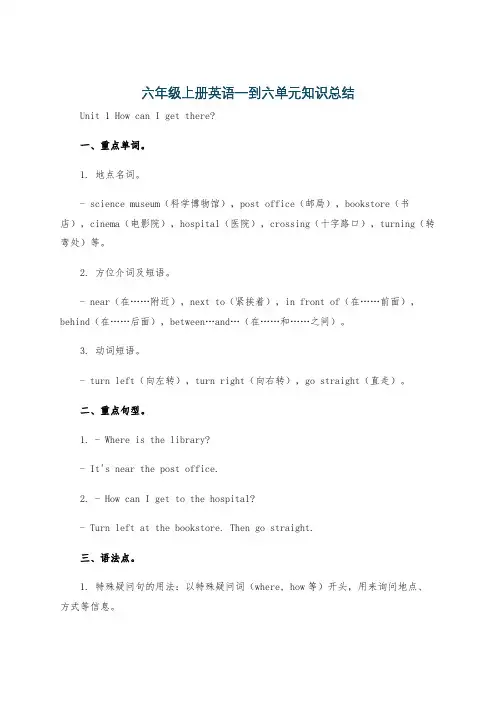
六年级上册英语一到六单元知识总结Unit 1 How can I get there?一、重点单词。
1. 地点名词。
- science museum(科学博物馆),post office(邮局),bookstore(书店),cinema(电影院),hospital(医院),crossing(十字路口),turning(转弯处)等。
2. 方位介词及短语。
- near(在……附近),next to(紧挨着),in front of(在……前面),behind(在……后面),between…and…(在……和……之间)。
3. 动词短语。
- turn left(向左转),turn right(向右转),go straight(直走)。
二、重点句型。
1. - Where is the library?- It's near the post office.2. - How can I get to the hospital?- Turn left at the bookstore. Then go straight.三、语法点。
1. 特殊疑问句的用法:以特殊疑问词(where, how等)开头,用来询问地点、方式等信息。
2. 一般现在时在问路指路中的运用。
Unit 2 Ways to go to school.一、重点单词。
1. 交通工具名词。
- by bike(骑自行车),by bus(乘公共汽车),by train(乘火车),by plane(乘飞机),on foot(步行),ship(轮船),subway(地铁)等。
2. 形容词。
- slow(慢的),fast(快的)。
3. 其他。
- traffic(交通),traffic lights(交通灯),stop(停),wait(等)。
二、重点句型。
1. - How do you come to school?- Usually, I come on foot.2. - How can I get to the Fuxing Hospital?- Take the No. 57 bus over there.三、语法点。

2017最新广州版英语六年级上册知识点汇总知识点概要:Module 1 Country lifeUnit 1 What are those farmers doing?Unit 2 A country life is a healthy lifeModule 2 City lifeUnit 3 Where are you from?Unit 4 I like the city very muchModule 3 HealthUnit 5 What’s the matter with you?Unit 6 The secret to good healthModule 4 Past experiencesUnit 7 What did you do yesterday?Unit 8 A trip to Hong KongModule 5 ChangesUnit 9 Was I a good girl back then?Unit 10 Then and nowModule 6 FestivalUnit 11 I like the Spring Festival bestUnit 12 Christmas以下为详细内容▼Module 1 Country lifeUnit 1 What are those farmers doing?一、词组feed the chickens and ducks feed the pigs feed the horse grow flowers and vegetables plant trees cut grassany other on the farm a few…二、句型:1.What are those farmers doing?They’re cutting grass to feed the animals.2.What do you grow on your farm?3.We have a few goats and pigs.4.There are fruit trees in this field.5.There is a cow on the farm.三、重点精析:1. any other + 名词单数,指一堆当中的的某一个any other + 名词复数,指一堆当中的一些如:Tom runs faster than any other student in his class.汤姆比他班上的任何人都跑得快。
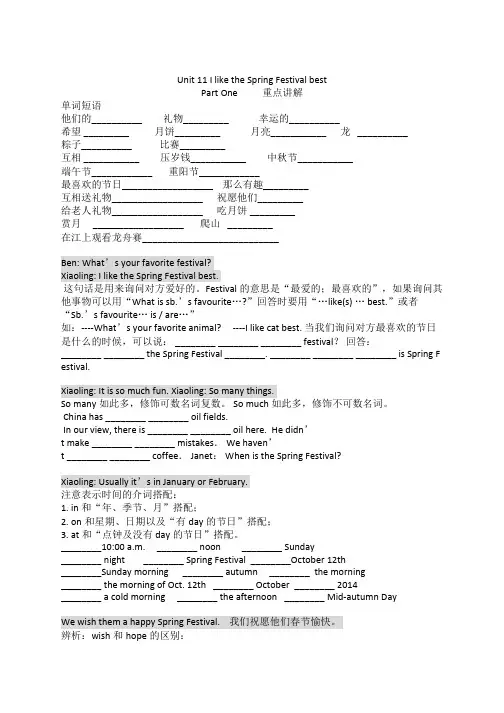
Unit 11 I like the Spring Festival bestPartOne 重点讲解单词短语他们的__________ 礼物_________ 幸运的__________希望 _________ 月饼_________ 月亮___________ 龙 __________ 粽子__________ 比赛_________互相 ___________ 压岁钱___________ 中秋节___________端午节____________ 重阳节____________最喜欢的节日__________________ 那么有趣_________互相送礼物__________________ 祝愿他们_________给老人礼物__________________ 吃月饼 _________赏月 __________________ 爬山 _________在江上观看龙舟赛___________________________Ben: What’s your favorite festival?Xiaoling: I like the Spring Festival best.这句话是用来询问对方爱好的。
Festival的意思是“最爱的;最喜欢的”,如果询问其他事物可以用“What is sb.’s favourite…?”回答时要用“…like(s) … best.”或者“Sb.’s favourite… is / are…”如:----What’s your favorite animal? ----I like cat best. 当我们询问对方最喜欢的节日是什么的时候,可以说: ________ ________ ________ festival?回答:________ ________ the Spring Festival ________. ________ ________ ________ is Spring F estival.Xiaoling: It is so much fun. Xiaoling: So many things.So many如此多,修饰可数名词复数。
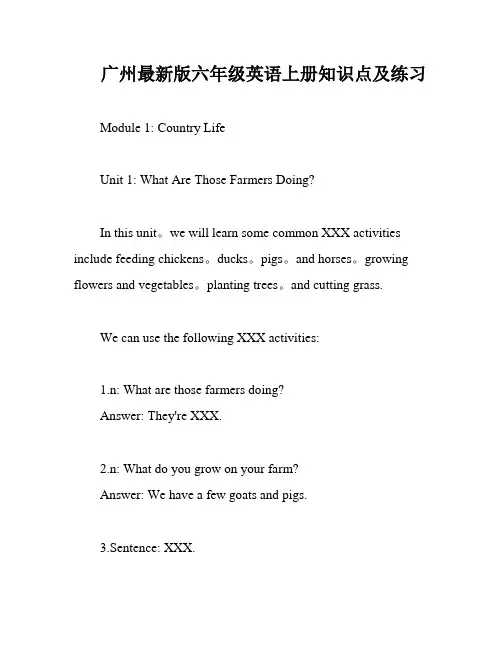
广州最新版六年级英语上册知识点及练习Module 1: Country LifeUnit 1: What Are Those Farmers Doing?In this unit。
we will learn some common XXX activities include feeding chickens。
ducks。
pigs。
and horses。
growing flowers and vegetables。
planting trees。
and cutting grass.We can use the following XXX activities:1.n: What are those farmers doing?Answer: They're XXX.2.n: What do you grow on your farm?Answer: We have a few goats and pigs.3.Sentence: XXX.4.Sentence: There is a cow on the farm.Here are some important points to keep in mind:1."Any other" + singular noun refers to one item from a group。
while "any other" + plural noun refers to some items from a group。
For example: Tom runs faster than any other student in his class。
Are you taking any other drugs at present?2."A little" or "a few" means some。
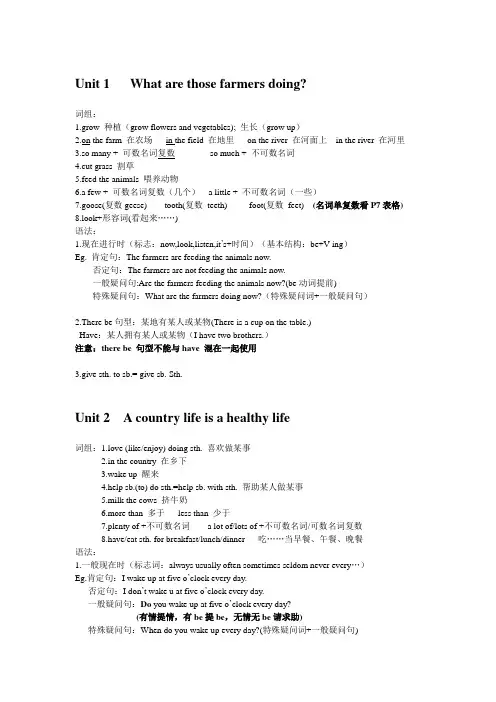
Unit 1 What are those farmers doing?词组:1.grow 种植(grow flowers and vegetables); 生长(grow up)2.on the farm 在农场in the field 在地里on the river 在河面上in the river 在河里3.so many + 可数名词复数so much + 不可数名词4.cut grass 割草5.feed the animals 喂养动物6.a few + 可数名词复数(几个) a little + 不可数名词(一些)7.goose(复数geese) tooth(复数teeth) foot(复数feet) (名词单复数看P7表格)8.look+形容词(看起来……)语法:1.现在进行时(标志:now,look,listen,it’s+时间)(基本结构:be+V-ing)Eg. 肯定句:The farmers are feeding the animals now.否定句:The farmers are not feeding the animals now.一般疑问句:Are the farmers feeding the animals now?(be动词提前)特殊疑问句:What are the farmers doing now?(特殊疑问词+一般疑问句)2.There be句型:某地有某人或某物(There is a cup on the table.)Have:某人拥有某人或某物(I have two brothers.)注意:there be 句型不能与have 混在一起使用3.give sth. to sb.= give sb. Sth.Unit 2 A country life is a healthy life词组:1.love (like/enjoy) doing sth. 喜欢做某事2.in the country 在乡下3.wake up 醒来4.help sb.(to) do sth.=help sb. with sth. 帮助某人做某事k the cows 挤牛奶6.more than 多于less than 少于7.plenty of +不可数名词 a lot of/lots of +不可数名词/可数名词复数8.have/eat sth. for breakfast/lunch/dinner 吃……当早餐、午餐、晚餐语法:1.一般现在时(标志词:always usually often sometimes seldom never every…)Eg.肯定句:I wake up at five o’clock every day.否定句:I don’t wake u at five o’clock every day.一般疑问句:Do you wake up at five o’clock every day?(有情提情,有be提be,无情无be请求助)特殊疑问句:When do you wake up every day?(特殊疑问词+一般疑问句)Unit 3 Where are you from?词组:1.Where are you from?=Where do you come from? 你来自哪里?2.be born出生(一般只用过去式)3.What’s …like?=What do/does …look like? ……怎么样?语法:1.注意各种场所,如buildings ,streets ,school, supermarket,hotel ,traffic,cinema,theater,park2.注意各种形容词,如tall/short, new/modern/old, wide/crowded, clean/dirty, heavy/thin, fast/slow,noisy/quiet,comfortable/uncomfortable3.人称的主格,宾格,所有格见P19Unit 4 I like the city very much词组:1.interested 感兴趣的(指人) interesting 有趣的(指事)2.A be different to/from B A不同于B3.The traffic is very heavy. 交通非常拥挤。
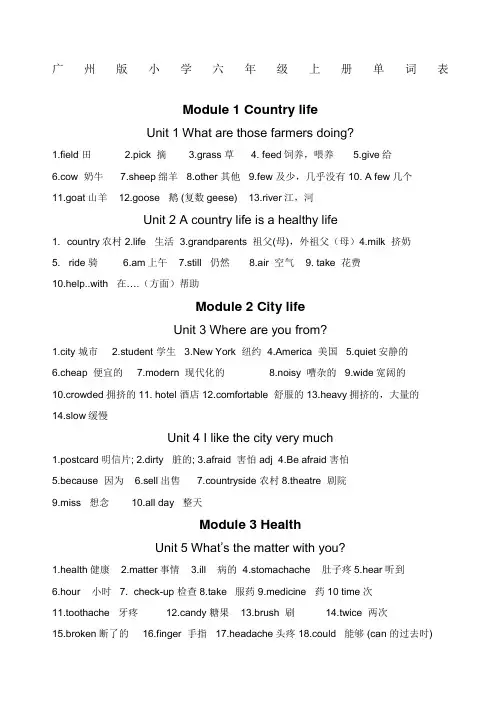
广州版小学六年级上册单词表Module 1 Country lifeUnit 1 What are those farmers doing?1.field 田2.pick 摘3.grass 草4. feed饲养,喂养5.give给6.cow 奶牛7.sheep绵羊8.other 其他9.few 及少,几乎没有 10. A few几个11.goat山羊 12.goose 鹅 (复数geese) 13.river江,河Unit 2 A country life is a healthy life1. country农村2.life 生活3.grandparents 祖父(母),外祖父(母)k 挤奶5. ride 骑6.am上午7.still 仍然8.air 空气9. take 花费10.help..with 在….(方面)帮助Module 2 City lifeUnit 3 Where are you from?1.city 城市2.student 学生3.New York 纽约4.America 美国5.quiet安静的6.cheap 便宜的7.modern 现代化的8.noisy 嘈杂的9.wide宽阔的10.crowded拥挤的11. hotel 酒店fortable 舒服的 13.heavy拥挤的,大量的14.slow缓慢Unit 4 I like the city very much1.postcard明信片;2.dirty 脏的;3.afraid 害怕 adj4.Be afraid 害怕5.because 因为6.sell出售7.countryside 农村8.theatre 剧院9.miss 想念 10.all day 整天Module 3 HealthUnit 5 What’s the matter with you?1.health健康2.matter事情3.ill 病的4.stomachache 肚子疼5.hear听到6.hour 小时7. check-up 检查8.take 服药9.medicine 药 10 time次11.toothache 牙疼 12.candy 糖果 13.brush 刷 14.twice 两次15.broken断了的 16.finger 手指 17.headache头疼 18.could 能够 (can 的过去时)19.fever发烧 20.rest休息 n 21.have a rest 休息一会儿22.have a cold 感冒 23. What’s the matter? 怎么回事Unit 6 The secret to good health1.secret 秘密2.simple 简单的3.least最少4.at least 至少5.diet 节食6.less较少的7.oily 多油的8.finally 最后地9.even 甚至10.smile微笑 11.keep a good diet 保持一个良好的饮食习惯Module 4 Past experiencesUnit 7 What did you do yesterday?1.experience经验2. yesterday 昨天3.angry 生气的4.came来(come的过去时)5.poor可怜的st 最近的7.year 年8.no/not at all一点都不9. bought buy的过去式 10.met meet的过去式 11.saw see的过去式12. read read的过去式 13.did 助动词,do/does 的过去时 14.year 年Unit 8 A trip to Hong Kong1.Disneyland迪士尼公园2.Mickey Mouse米老鼠3.Donald Duck 唐老鸭ter后来5.felt feel的过去式6.until 直到7.better 更好的8. surprised惊讶的 9.sat sit的过去式 10 were are 的过去时Module 5 ChangesUnit 9 Was I a good girl back then?1.back then 当时,过去那个时候2. polite有礼貌的3.surf浏览4.Internet 因特网5.surf the Internet 上网6.fat肥胖的7.cry哭Unit 10 Then and now1. ago ……之前2.village 村子3.near by 附近4.far away遥远5.office 办公室6.store 商店7.department store百货公司8.then当时9. cartoon 卡通片Module 6 FestivalUnit 11 I like the Spring Festival best1.their他们的2.gift 礼物3. lucky幸运的4.each other 相互5.wish希望6.mooncake 月饼7.moon 月亮8.dragon 龙9. zongzi粽子 10.race 比赛11.lucky money 压岁钱12 Mid-autumn Festival中秋节 13.Dragon Boat Festival 端午节14.Chongyang Festival重阳节Unit 12 Christmas1.share分享2.wonderful 奇妙的3.hurry 匆忙4.bring带来5.ham 火腿6.turkey 火鸡7.put up 竖起。
广州新版英语第一学期六年级知识点攻破Module 1 Country LifeUnit 1 What are those farmers doing?一.短语词组(能够听说读写)1. on the farm在农场2. many things很多东西3. fruit trees 水果树4.in the field 在田里5. pick the apples摘苹果6. grow rice 种田7. those farmers 那些农民8. cut grass 割草9. feed the animals喂动物10. give sb sth / give sth to sb 给某人某物11. other animals 其他动物12. a few 一些13. on the river 在河面上14. look lovely 看起来好可爱15. feed the chickens 喂鸡肉16. feed the pigs 喂猪17. feed the horse 喂马18. grow flowers种花19. grow vegetables 种菜20 plant trees种树二.语法知识点名词的复数的复习。
A.单复数不变1.sheep ( )2. deer( )3. grass ( )作为草地可以在后面加es.4. fish ( )B.直接在单词后面加上s. 1. 以清辅音结尾的单词加s变为复数的时候,发/s/的音。
1.book (books)2. shop( shops )3. cake (cakes)4. cliff (cliffs)2.以浊辅音结尾的单词加s变为复数的时候,后面的s 发音为/z/ 1.river (rivers ) 2. toy(toys )3. pig (pigs ) 4 . dog (dogs)C.以s , x, ch, sh 结尾的词加-es 读/iz/1.bus ( )2. box( )3. torch ( )4. brush( )D. 以辅音字母加y结尾的词去y改ies (注意不是辅音字母+y的词)1. factory (factories )2. study (studies )3. monkey(monkeys )4. play (plays)E. 以o结尾的单词,有生命的后面加es,没有生命的后面加s。
广州六年级上册各单元英语知识点归纳Module 1 Country lifeUnit 1 What are those farmers doing?一、词组:feed the chickens and ducks, feed the pigs, feed the horse, grow flowers and vegetables, plant trees, cut grass, any other, on the farm, a few…二、句型:1.What are those farmers doing? They’re cutting grass to feed the animals.2.What do you grow on your farm?3.We have a few goats and pigs.4.There are fruit trees in this field.5.There is a cow on the farm.三、重点语法:1. 名词单复数:2. any other + 名词单数,和any other + 名词复数,3.表示肯定意义:a little / a few 有一点,有一些表示否定意义: little / few 几乎没有的a few /few +可数名词复数little / a little +不可数名词many /much 意为很多的many +可数名词复数much +不可数名词4. use sth. to do sth. 用……做某事5. be from = come frome 来自……6. also; too; either 的区别:7. give … to… 把…… 给…… give sth. to sb. = give sb, sth.8. There be句型Unit 2 A country life is a healthy life一、词组:wake up, more than, plenty of, ride a bike, get home, at that time, thanks for, lots of…二、句型:1. A country life is a healthy life.2. It takes about 40 minutes.3. I am always very busy but I never feel tired, because I have plenty of exercise.4. When I get home after school, there is still much work to do.三、重点语法:1. live in + 大地点live at + 小地点(如街道、街区等)live on + 楼层2. help sb. (to) do sth. 帮助某人做某事help sb. with sth. 帮助某人做某事3. more than+数词超过,多于4. plenty of = a lot of = lots of + 可数名词复数/ 不可数名词表示许多、大量5. It takes about 40 minutes. 这大约要花二十分钟。
广东开心版英语六年级上册各单元学习重点2.My foot hurts.我脚疼。
3.Let me take a look。
Be more XXX.让我看看,下次要更小心。
4.I’m XXX XXX XXX.我感到肚子疼。
5.Please take some medicine.请吃些药。
6.What’s the matter?怎么了?7.I caught a cold.我感冒了。
8.Please stay in bed.请卧床休息。
9.What are they up to?他们在干什么?10.They’re digging a well.他们在挖井。
解释:1.“What’s wrong with you?” means “What’s the matter with you?” It is used to ask about someone’s physical or mental n。
or to inquire about a sudden event。
XXX:What’s wrong with your mother?”She hurt her hand.”2.“You should see the doctor” means that it is mended to go to the doctor for medical n.3.“My foot hurts” means that there is pain in the foot.4.“Let me take a look。
Be more careful next time” means that XXX injury。
and reminds the person to be more careful in the future.5.“I’m XXX” means that there is XXX.6.“XXX?” is another way to ask about XXX.7.“I caught a cold” means that someone has a cold or is experiencing cold-XXX.8.“Please stay in bed” is a XXX.9.“What are they up to?” is a way to ask about XXX.10.“They’re digging a well” means that they are digging a hole in the ground to access water.在问路时,询问某个地点的位置,常用句型为“Whereis/are + 地点?”3.Go XXX.直走,它在公园对面。
广州六年级英语上册知识点IntroductionIn the sixth grade English curriculum in Guangzhou, there are several key points that students need to grasp. These knowledge points are essential for building a solid foundation in the English language. In this article, we will explore and discuss these knowledge points to help students better understand and apply them in their English studies.1. VocabularyVocabulary plays a crucial role in language learning. In the sixth grade, students are expected to expand their vocabulary, including both common and academic words. It is important for students to understand the meaning, spelling, and usage of these words. Some effective strategies for vocabulary learning include reading books, practicing word games, and using flashcards.2. GrammarMastering grammar rules is vital for students to form proper sentences and effectively communicate in English. In the sixth grade,students focus on more complex sentence structures and tenses. They learn about the correct usage of articles, prepositions, conjunctions, and verb forms. Students should practice analyzing sentence structures and applying appropriate grammar rules in their writing and speaking.3. Reading ComprehensionTo improve reading comprehension, students are encouraged to read a wide variety of texts, including short stories, newspaper articles, and non-fiction books. They should develop the ability to understand the main idea of a text, identify supporting details, make inferences, and draw conclusions. Regular practice of reading and answering comprehension questions will enhance their reading skills.4. Writing SkillsWriting is an essential skill that allows students to express their thoughts and ideas effectively. In the sixth grade, students learn to write coherent paragraphs and short essays. They should focus on organizing their writing, using appropriate transition words, and maintaining a consistent point of view. Practice in writing different types of texts, such as narratives, descriptions, and persuasive essays, will help students develop their writing skills.5. Listening and SpeakingListening and speaking skills are fundamental in communication. Students should engage in various activities to enhance their listening and speaking abilities. These activities include listening to audio materials, watching videos with English subtitles, and participating in group discussions. By actively listening and expressing their thoughts orally, students can improve their communication skills and fluency in English.ConclusionIn conclusion, the knowledge points covered in the sixth grade English curriculum in Guangzhou are crucial for students to become proficient in the English language. By focusing on vocabulary, grammar, reading comprehension, writing skills, as well as listening and speaking abilities, students will develop a strong foundation for further English learning. It is essential for students to actively engage in practice and seek opportunities to apply these knowledge points in their daily lives. With consistent effort and dedication, students will achieve success in their English studies.。